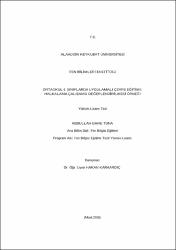Ortaokul 6. sınıflarda uygulamalı çevre eğitimi: Halkalama çalışması değerlendirilmesi örneği
Özet
Yapılan bu araştırmada, ortaokul 6. sınıf öğrencilerinin çevreye yönelik bilgi, duygusal yaklaşım ve davranış eğilimlerinin uygulamalı çevre eğitimi yoluyla incelenmesi ve uygulamalı eğitimlerin bunlar üzerinde olumlu bir etkide bulunup bulunmadığının tespit edilmesi amaçlanmıştır. Araştırma, tarama modelinde gerçekleştirilmiştir. Ayrıca, araştırma ön test-son test kontrol gruplu deneysel desen olarak tasarlanmıştır. Araştırmanın evrenini 2018-2019 eğitim – öğretim yılında Antalya ilinde öğrenim görmekte olan ortaokul 6. sınıf öğrencileri oluşturmaktadır. Örneklem ise Antalya ilinin Serik ilçesinde bulunan toplam 7 ortaokulda öğrenim gören 350 öğrenciden meydana gelmiştir. Örneklem içerisinde yer alan öğrencilerin seçiminde "basit rastgele örnekleme" yöntemi kullanılmıştır. Veri toplama aracı olarak Avan (2011) tarafından geliştirilen "Çevre Eğitimine Yönelik Bilgi, Duygu ve Davranış Ölçeği" kullanılmıştır. Çevre Eğitimine Yönelik Bilgi, Duygu ve Davranış Ölçeği'nin geçerlik ve güvenirlik çalışmaları yapılmıştır. Uygulamaya başlamadan önce deney ve kontrol grubundaki öğrencilere ölçekler ön test olarak uygulanmıştır. Ardından deney grubu öğrencilerine 4 saatlik teorik ve yine 4 saatlik uygulamalı çevre eğitimi verilmiştir. Uygulamalı çevre eğitimi bittikten yaklaşık bir hafta sonra ilgili okulun deney ve kontrol grubu öğrencilerine ölçekler son test uygulanarak veri toplama aşaması tamamlanmıştır. Toplanan veriler nicel analiz yöntemleri kullanılarak değerlendirilmiştir. Deney ve kontrol gruplarının karşılaştırılmasında ilişkisiz örneklemler t-testi, ön test ve son test puanlarının karşılaştırılmasında ilişkili örneklemler t-testi, cinsiyete göre karşılaştırmada ilişkisiz örneklemler t-testi, korelasyon analizlerinde ise Pearson Korelasyon Analizi kullanılmıştır. Uygulamalı çevre eğitimi öncesinde ön test uygulanan kontrol ve deney grubunun bilgi, duygu ve davranış eğilimlerinin birbirine eşdeğer olduğu yani anlamlı bir fark olmadığı tespit edilmiştir. Uygulamalı çevre eğitimi sonrası ise öğrencilerin çevreye yönelik bilgi, olumlu duygusal yaklaşım ve davranış eğilimlerine anlamlı bir katkı sağlamıştır. Deney grubundaki öğrencilerin eğitim öncesindeki ortalama puanları eğitim sonrasında anlamlı bir artış gösterirken kontrol grubunda anlamlı bir artış görülmemiştir. Ayrıca deney ve kontrol grubunda yer alan erkek ve kız öğrenciler arasında yani cinsiyete göre anlamlı bir fark tespit edilmemiştir. In this study, it is aimed to investigate the knowledge, emotional approach and behavior tendencies of the 6th grade students in the middle school by means of applied environmental education and to determine whether practical trainings have a positive effect on them. The research was carried out in the screening model. In addition, the research was designed as an experimental design with pre-test-post-test control group. The population of the study is composed of 6th grade students in the middle of 2018-2019 academic year in Antalya. The sample consisted of 350 students studying in 7 secondary schools in Serik, Antalya. The seçim simple random sampling öğ method was used in the selection of the students. "Knowledge, Emotion and Behavior Scale for Environmental Education gu developed by Avan (2011) was used as data collection tool. The validity and reliability studies of the Knowledge, Emotion and Behavior Scale for Environmental Education were conducted. Before the application, the scales were applied as pre-test to the students in the experimental and control groups. Then, experimental group students were given 4 hours of theoretical and 4 hours of applied environmental education. Approximately one week after the end of the applied environmental education, the data collection phase of the experimental school and control group students was completed by using the final test. The collected data were evaluated by using quantitative analysis methods. In the comparison of experimental and control groups, unrelated samples t-test, pre-test and post-test scores were compared with t-test, non-independent samples t-test in comparison with gender, and Pearson Correlation Analysis in correlation analyzes. It was determined that the knowledge, emotion and behavior tendencies of the control and experimental groups pre-tested before the applied environmental education were equivalent to each other, ie there was no significant difference. After the applied environmental education, the students' information about the environment made a significant contribution to the positive emotional approach and behavioral tendencies. The mean scores of the students in the experimental group before the training showed a significant increase after the training, while there was no significant increase in the control group. In addition, no significant difference was found between male and female students in the experimental and control groups.
Bağlantı
https://tez.yok.gov.tr/UlusalTezMerkezi/TezGoster?key=Mir2lXQK1dkmQ9Ige3PZbjEU0RJbYbf5BqFxh7LKxY175p2O_ig6AKI6wDXQu8GGhttps://hdl.handle.net/20.500.12868/175
Koleksiyonlar
- Tez Koleksiyonu [242]


















